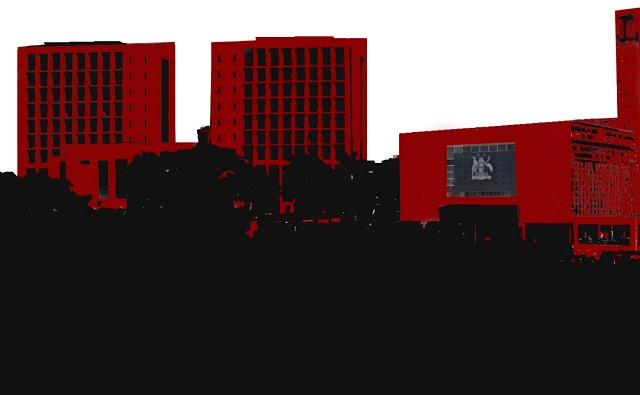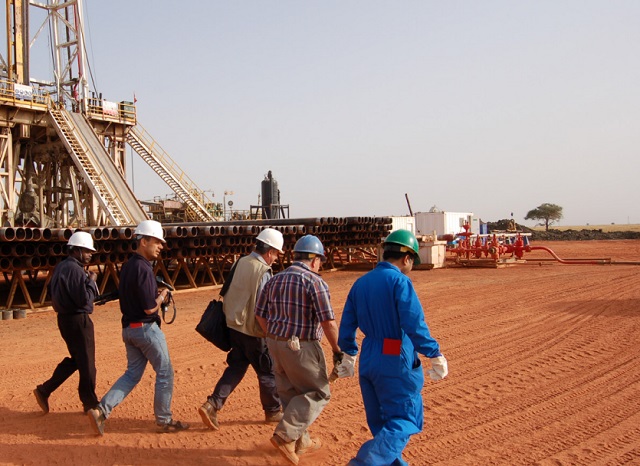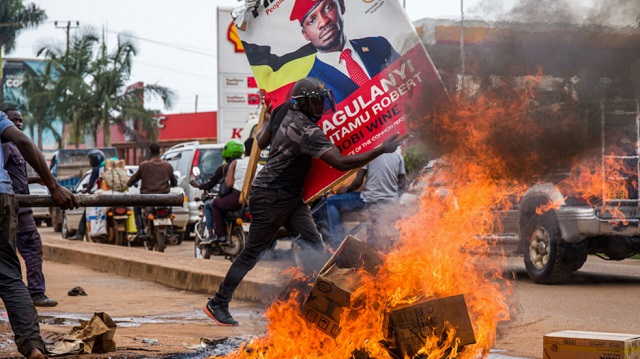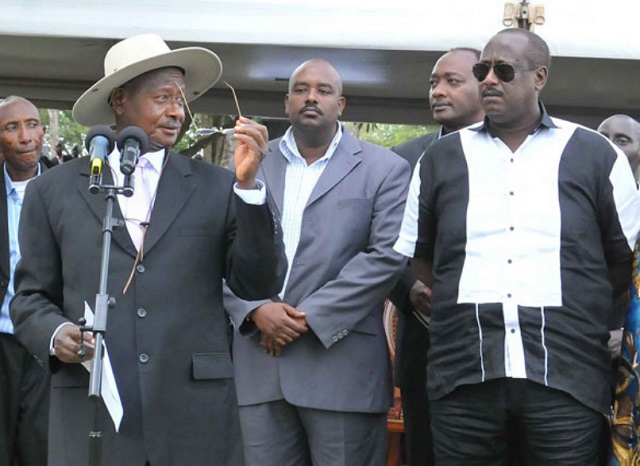
Revealing the networks of people with power
Kampala, Uganda | THE INDEPENDENT | In the April 30-07 issue of The Independent, Andrew Mwenda; in his column, wrote an article entitled “Paved with good intentions: How Western interventions in African affairs, even when well intentioned, produce bad results.”
In that article, Mwenda became possibly the first journalist in Uganda to use the expression “shadow state” in black and white.
Mwenda wrote: “Who is responsible for the killings that happened during last year’s riots? Who is responsible for the continued abduction of opposition activists? To my knowledge, there is a shadow state conducting these operations.”
He added: “Nearly all the major leaders of mainstream security institutions of the state are unaware and disapprove of what is going on.”
How is what Mwenda was saying possible? That is what most discerning readers must have asked since.
Now a renowned professor of democracy and African studies, Nic Cheeseman, has written about two new studies about what Mwenda was referring to, the shadow state.
The shadow state is best understood as an informal network of domestic and international actors, most of whom are unelected or are not operating in their official capacity, who collude to assert and maintain political, social and economic control for their own benefit.
The shadow state activities focus more on the monopolisation of political and economic power in the hands of a small number of elected and unelected officials.
“In this sense, almost all countries across the globe feature some degree of a shadow state,” says Cheeseman, “In the United States, for example, the term ‘deep state’ has come to be used to refer to the undue influence that lobbyists and the military–industrial complex can wield within the American political system.”
“These powerful private individuals capture public political institutions and subvert them through a system that is often more powerful than the official institutions. The shadow state is inherently antidemocratic and antidevelopment,” Cheeseman writes.
Cheeseman’s writing, published in an essay entitled ‘Shadow states are the biggest threat to democracy in Africa: fresh reports detail how’ published on the online intellectual journal, The Conversation, on Sept.15, are based on two reports about the shadow state and its threat to democracy in Africa.
The first report is published by Ghana’s Centre for Democratic Development. It focuses on the capture and subversion of democratic institutions in Benin, Ghana, Kenya, Mozambique and Nigeria.
Cheeseman says studies in these countries show that ruling parties can “hijack” democracy and appropriate its benefits and that they do this by capturing the institutions of democracy itself. This includes electoral commissions, judiciaries, legislatures and even the media and civil society.
The second report was curated by Democracy in Africa; an online journal that encourages academics to share their work on African politics. This report looked at how unelected networks can infiltrate and subvert state structures through emergence of shadow states. Studies were done in the Democratic Republic of Congo (DRC), Uganda, Zambia and Zimbabwe.
The researchers describe how the shadow state grabs the power to make important political and economic decisions from democratic institutions, such as the parliament into the hands of a ‘power elite.’
The power elite meanwhile are described as “a well-structured network of people with privileged access to the inner circle of power.” The privileged may be located in government, state institutions, state-owned enterprises (SOEs), private businesses, security agencies, traditional leaders, family networks and the governing party.
“They are dangerous because their activities undermine democratic accountability and divert the focus of government to meeting the needs of relatively small networks of privileged individuals,” the researchers say.
“There appears to be a clear relationship between the presence of a shadow state and the level of poverty,” the researchers say, “The extent to which this correlation holds, however, depends on the relative power of the shadow state, the breadth of its operations and the proportion of state resources it siphons off and secures outside of the country through international networks.”
According to the researchers, their analyses of the DRC, Uganda, Zambia and Zimbabwe reveal that the shadow states varies from country to country but usually features the president at the apex.
The shadow state usually runs through the president or prime minister, as well as through senior civil servants, such as permanent secretaries (or their equivalents), who run ministries.
The need to generate resources both for personal enrichment and to fund election campaigns also means that it is common to find business people and central bank officials in shadow state networks. Similarly, protecting members of the shadow state from prosecution for illegal activities ensures that senior members of the judiciary are usually co-opted.
Also, because shadow states often emerge where there is lack of trust, presidents tend to surround themselves with family members on whose loyalty they can depend.

Museveni’s non-expendables
In Uganda, the researchers say, economic and political power is mediated through a network of individuals, most of whom are closely linked to President Yoweri Museveni and his family. These linkages include blood, marriage, kinship and the shared experience of those who served in the liberation struggle, known as the Bush War.
“The image of a monarchy, with a strong military influence, has been used to describe the near absolute control over the state and vital sectors of the economy held by Museveni and his extended family,” they say, “This also applies to ambitions for dynastic renewal through Museveni’s son, Muhoozi Kainerugaba – even though the incumbent monarch himself seems the least enthusiastic proponent of such as he appears rather indifferent to who rules after his intended life presidency.”
Ultimately, the researchers say, all shadow state actors are expendable and Museveni frequently cuts shadow state actors loose, depriving them of access to economic, social and political resources.
But a small number of figures, including Gen. Salim Saleh, wield enough power to critically destabilise the system or put up resistance if the president chose to sanction them.
Sam Kutesa is mentioned as “one of the most consistent and powerful shadow state actors.” It is mentioned that his late wife, Jennifer, was a relative of Janet Museveni and his daughter, Charlotte, is married to First son Muhoozi Kainerugaba.
Janet, they say, has cultivated her web of relations in the Museveni system that spans diplomacy, military, commerce, parastatals and State House. Henry Tumukunde and Security Minister Jim Muhwezi are married to cousins of Janet. Bob Kabonero, a powerful businessperson and broker who has interests in oil and gas, telecommunications and casinos, and Richard Kabonero, one of Museveni’s most high-profile diplomats, are Janet’s cousins. Minister of State for animal industry, Bright Rwamirama, is also a cousin of Janet, and Janet’s relative Hannington Karuhanga sits on several boards, including Airtel and the Uganda Coffee Development Authority. He formerly chaired Stanbic Bank. Others include the president’s former legal aide, Justus Karuhanga and State House undersecretary for finance and administration, Hope Nyakairu. The president’s long-time political adviser and Premier Dairies owner, Moses Byaruhanga, is married to Janet’s cousin, Peace.
The researchers say Museveni’s regime rests on two main pillars: Military officers and an extended quasi-royal family.
Business associates help to fund the campaign of the ruling party, while the media is used to prevent the opposition from getting their message out, and members of the security forces—often operating out of uniform—intimidate and harass opposition supporters.
But, the researchers say, the system is becoming increasingly fluid, perhaps unstable, as generational change (through death or retirement) impacts the regime.
It must be pointed out that some of the researchers’ findings may appear off the mark if not inaccurate to informed readers. But the researchers say in doing their work, many people were reluctant to talk on the record. Many were reportedly concerned that their safety and that of participants would have been put at risk if their investigations were perceived to be a threat to shadow state actors.
But they say President Museveni presides over a set of personal networks that are embedded in family ties and personal relationships—the royal family—and secured through his control over the security forces, which play a variety of roles, including occupying what are officially civilian positions.
Role of security forces
According to them, as in many shadow states, the Ugandan security forces have played an important role in the competition for political power by symbolically standing behind the president and making it clear that despite the reintroduction of multiparty politics in 2005, Ugandan citizens do not have a genuine choice over the identity of the government.
According to the researchers, the security forces occupy a more prominent role in the shadow states of countries that have experienced either military rule or civil conflict, often leading to greater human rights abuses. At the same time, multinational companies and economic brokers are more likely to occupy prominent positions in countries with valuable natural resources, such as the DRC.
The researchers say the significance of the shadow state in Uganda is, however, constrained because President Museveni has a range of official institutions at his disposal, and therefore is less reliant on informal networks than other presidents studied.
This, according to the researchers, is because the high levels of repression under President Museveni’s National Resistance Movement (NRM) have gone hand in hand with the creation of a fairly effective set of formal political institutions that should not be considered weak simply because they are used to sustain authoritarian rather than democratic governance.
The reverse is true in the DRC, where formal state institutions are weak and the government struggles to assert its authority over the whole territory. The security forces occupy a role that is much broader than their formal activity and are intimately involved in a range of predatory economic behaviours; including smuggling and taxation.
In Zambia, the police and army are often used to intimidate the opponents of the government, but they never play a major role in shaping the composition of the government or public policy. Instead, the Zambian shadow state relies more heavily on a network of civilian business people, judges and politicians.
The researchers say that, in countries where authoritarian political institutions are strong, as in Uganda and Zimbabwe, the shadow state may only play a supplementary role in undermining democratic processes.
But even when the shadow state is less extensive, as in Uganda, it may still reduce the prospects for political change in conjunction with a dominant ruling party. In turn, political control enables the members of the shadow state to entrench their position.
Museveni, they say, keeps himself in power by blurring of the line between security forces and militias around elections. These are deployed to harass opposition supporters, and demobilise opposition rallies and post-election protests.

Economic networks
Meanwhile, the economic networks that sustain the Uganda shadow state are predominantly domestic. Funds for election campaigning, for example, are mainly generated by raiding the public purse and securing kickbacks from Ugandan business people. This is because, prior to the recent discovery of commercially viable oil reserves, the Ugandan economy was predominantly agricultural.
The researchers say although Museveni’s regime benefitted from high in-flows of foreign aid during its period as a “donor darling,” before his reputation as a progressive leader was undermined by creeping authoritarianism, the shadow state appears to have developed less extensive international financial connections. The exception has been the outside involvement in the smuggling of high-value mineral resources out of the DRC – done by military forces.
The researchers say the emerging mining and oil sectors could generate stronger ties to international economic networks over time. They mention Gen. Salim Saleh’s relationships with Chinese investors, his wife; Jovia Akandwanaho’s cross border activities, including trade in diamonds and narcotics, and Maj. Gen. Leo Kyanda, the Joint chief of staff.
They mention Esteri, Saleh and Jovia’s daughter who manages several of the family business interests, and co-own the production company, Isaias 60, with Museveni’s daughter, Natasha. Business people Kellen Kayonga, treasurer of the Uganda Chamber of Mines and Petroleum, and Barnabas Taremwa, a well-known player in the mining sector, are mentioned.
Outside of such close family ties, names like former long-serving cabinet minister, Henry Kajura from Bunyoro are mentioned. Others are recently deceased matriarch, Constance Muhangazima, and her offspring (Andrew Mwenda, Gen. Kayanja Muhanga, and sister, Margaret Muhanga) from Tooro are mentioned.
In non-western regions, Richard Todwong, the younger brother of UPDF reserve force commander, Maj. Gen. Otema Awany, from Acholi are mentioned.
The researchers note that high profile members of the Ugandan shadow state have also been linked to the narcotics trade. Most notably, during the July 2019 trial of the Kenyan–Indian Akasha brothers in the United States. One of the president’s in-laws was documented as an importer of ephedrine, which is often used to produce methamphetamine, more commonly known as crystal meth.
“It is important to note, however, that this does not mean that the whole state has been criminalised or is dependent on the proceeds of illicit trade,” the researchers say, “Nonetheless it does demonstrate just how damaging the shadow state can be, in particular its capacity to undermine the rule of law.”
The researchers say manipulation of public funds in Uganda occurs through straightforward patronage and the distribution of development funds to reward ruling party supporters through the formal state. But when illicit economic activities are used to raise funds, business people get privileged access to the corridors of power. Those closely connected to the regime are able to amass great wealth while generating funds to support ruling party election campaigns.
They say those that do not engage in political activities against Museveni’s regime are largely left alone. But those who are thought to have opposition leanings or who become so wealthy that they have the potential to finance an opposition campaign—such as Charles Mbire, Patrick Bitature and Mohan Kiwanuka—are integrated into Museveni’s networks to ensure that opposition candidates do not have access to private funding.
The research was done when Keith Muhakanizi was permanent secretary to the treasury and the researchers say he was strategically placed to manipulate government finances. They point out how in 2014, Bank of Uganda (BoU) governor, Emmanuel Tumusiime-Mutebile, admitted that he had been ‘misled’ to finance election campaigns from central Bank coffers.
They name Kampala business person, Ben Kavuya, who is one of the biggest money lenders. Some businesses are bound to the regime through tax exemptions, which enable them to make inflated profits while denying the treasury valuable resources.
They talk of how Danze, a company set up by the ruling party, was engaged in large-scale smuggling in the 1990s. They also mention Dott Services, an Indian-owned construction and engineering company, Operation Wealth Creation, and the Youth Livelihood Funds.
Ultimately, Cheeseman says, one of the most popular framework used to conceptualise Africa over the last 30 years, neopatrimonialism, depicts African politics as a struggle between the formal rules set down in constitutions and legislation, on the one hand, and the informal networks and relationships emanating from the head of government; the president or sometimes the prime minister, on the other.
Cheeseman describes the shadow state as the complex networks of people that wield considerable influence in many countries. They are the underbelly of the formal state as set down in constitutions and legislation; the informal power structure that networks depend on to maintain their economic and political privileges.
He says members of the shadow state collude to wield political, social and economic authority for their own benefit and that the actors are both domestic and international. Some are elected others are not and some hold official positions others do not.
Politically connected business elites and private companies can even manipulate the economy as seen when, on September 19, 2019 companies linked to the president and military elites in Zambia, fearing a currency collapse, used their protected political status to illegally purchase a vast amount of U.S. dollars on the parallel market, fuelling higher exchange rates. The price of food was pushed up, confidence in the currency was undermined, and inflation rose.

Members of the shadow state could be:
- business leaders
- bank managers and central bank officials
- senior members of the judiciary
- members of the electoral commission
- members of the tax authority
- members of regulatory bodies in areas such as land & planning, safety and food production
- political fixers (brokers)
- media owners
- traditional, ethnic and religious leaders
- senior officials in the security forces
- militias and private security
- family members of the above
- multinational companies, economic brokers, and foreign banks
- international supporters, including foreign governments
- transnational criminal networks
****
 The Independent Uganda: You get the Truth we Pay the Price
The Independent Uganda: You get the Truth we Pay the Price






Wow… Mwenda must be onto something…….. keeping eyes on the ball…… hoping cheeseman is not Besigye or Winnie.
This finally is an article from Mwendas paper that is highly factual and not simply pontificating and making wild allegations.
A well researched piece of work with reference to the work of prof Cheeseman to Extrapolate Uganda politics . You do not go far to see the neo-patrimonialism – absolute ruler using his power to amend the instruments of governance- courts, media parliament and civil society.